Servicios Personalizados
Articulo
Indicadores
Links relacionados
-
 Citado por Google
Citado por Google -
 Similares en Google
Similares en Google
Compartir
Journal of Contemporary Management
versión On-line ISSN 1815-7440
JCMAN vol.7 no.1 Meyerton 2010
RESEARCH ARTICLES
Corporate sustainability: a social-ecological research agenda for South African business
LK HaywoodI; AC BrentII; DH TrotterI; R WiseI
ISustainable Social Ecological Systems Research Group, Natural Resources and the Environment, Council for Scientific and Industrial Research
IISchool of Public Management and Planning, Sustainability Institute, Stellenbosch University
ABSTRACT
In this paper we consider the increasingly prominent expectations that business can and will significantly contribute to sustainable development. We use the framework of social-ecological systems, and the principles thereof, as a lens to evaluate the corporate approach to sustainability management through a review of the literature and a number of cases. South African business is realising that changes to the health of supporting ecosystems pose risks to business operations and long-term sustainability. From the evaluation we propose that a core limitation preventing business from making meaningful contributions to sustainability is that they are unable to sufficiently address risk and uncertainty with the reductionist toolset currently available. A social-ecological systems approach, in which a business understands that it is an integral component of the system, could help the business understand the resilience of the system in which it operates and how to adapt to risk to ensure sustainability. We propose a research agenda that addresses the underlying lack of integration between the natural and business science, as well as some of the practicalities of enhancing corporate sustainability management through tool development.
Key phrases: Corporate sustainability, risk, resilience, social-ecological system
INTRODUCTION
The concept of sustainable development, and its most commonly accepted and referred to definition of the World Commission on Environment and Development (WCED 1987) (see Figure 1), was a major global turning point and has subsequently become the core element of environmental discourse. "Sustainable development" has offered the notion of being able to reconcile the conundrum of depleting natural resources and make it possible to view environmental protection and economic development as opposite sides of the same coin.
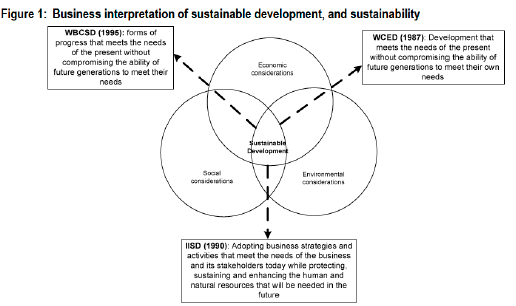
Since the formation of bodies such as the World Business Council for Sustainable Development (established in 1995) (WBCSD 2006a) and the International Institute of Sustainable Development (established in 1990) (IISD 1992) the business world has seen a plethora of definitions of sustainable development (see Figure 1 for some examples). Most, if not all, of these definitions are based on interpretations that ensure the goals and needs of corporations themselves are not compromised (Lafferty & Langhelle 1999; Welford 1995, 1997; Ketola 2007). Sustainable development has thereby offered the management solution of 'business as usual' as long as businesses 'consider and report' the implications of their actions from economic, environmental and social perspectives It appears that the implicit assumption underlying these definitions is that sustainability principles will ultimately lead to growth and development within society that is sustainable.
By providing the goods and services demanded by the public, business provides vital societal needs. However, in doing so, be it because of the resources they use, the processes that they apply or the products that they manufacture in order to meet growing demands, business activities have been viewed as major contributors to environmental destruction and degradation (Welford & Gouldson 1993). The escalating consumption of natural resources has advanced human development at a growing environmental cost (see Box 1). Furthermore, human development has not been consistent across all of world societies with increasing levels of poverty and inequality, which are now addressed through political interventions such the Millennium Development Goals (Hamann 2006). Thus, the implicit assumption underlying the (business) definitions of sustainable development seem invalid.
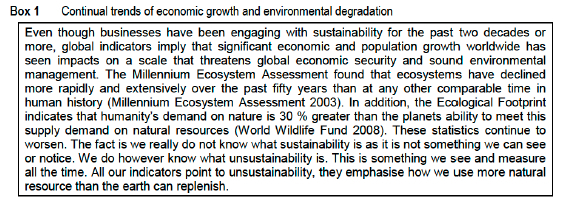
Business is facing unexpected risks and uncertainty to society and ecosystems upon which its activities depend. The consequence has been a call to move beyond the traditional perspective of the basic and most fundamental purpose of business, of continually increasing shareholder value of the company in a responsible and ethical manner, but to also continually improve goods and services for a growing population at affordable prices in an environmental sustainable manner (WBCSD 2006b). Business is increasingly required and expected to take on substantial responsibility and roles in undertaking and promoting processes that facilitate and achieve sustainable development recognising that environmental protection and social responsibility are important to both shareholders and stakeholders (Fiksel 2003; Ketola 2007). This responsibility is being driven by numerous forces or factors, some of which are summarised in Table 1.
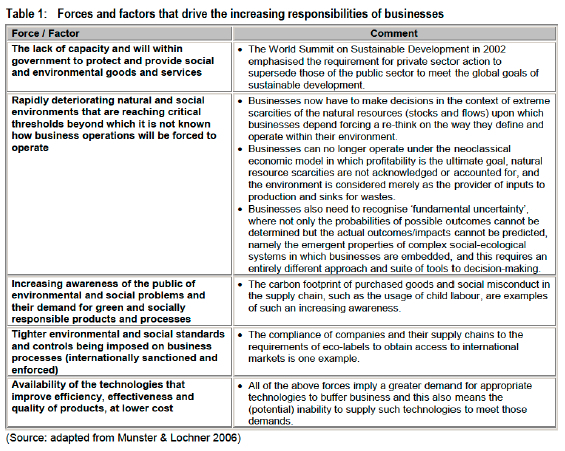
In response to the drivers a number of sustainability codes and standards have subsequently been developed (see Table 2). The business world has increasingly played a proactive role in the formulation of such codes and standards, and utilise these to capture growing (green) markets (Rutherford 2006). To this end the concept of sustainability has also driven innovation in corporations so that the concept is addressed from a business case perspective (Rodriguez, Ricart & Sanchez 2002; Schaltegger & Wagner 2006). Businesses have managed to maintain their economic viability by recognising the value of enhancing non-financial or other sustainability dimensions that include health and safety aspects of an operation, the impact of pollution and resource consumption on the natural environment, being socially responsible and contributing to sustainable community development, and ensuring the broader economic contributions of operations are injected into the regions where they operate, to name but a few.
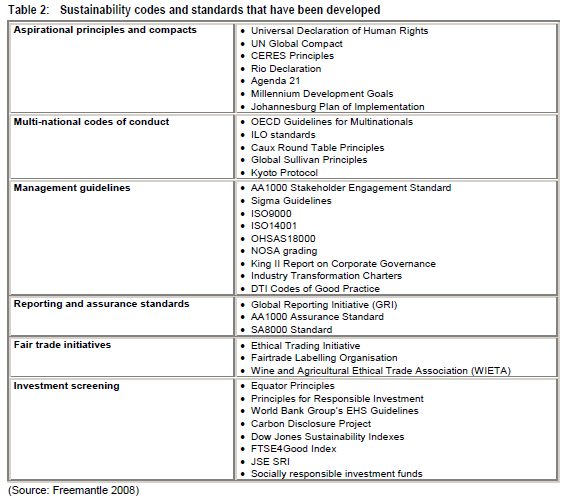
Business has also been good at planning and strategising to deal with associated risks in their operating environments. This has generally been the case where the impacts and probabilities are 'local' in orientation (WBCSD 2004). However, the characteristics of these risks, as determined by some of the abovementioned forces or factors, are rapidly changing in terms of:
• 'frequency', e.g. increasing number of crop failures, decreasing rainfall events, increasing floods, increasing child labour in value chains, and others;
• 'magnitude', e.g. substantially heavier downpours of rain, longer droughts, 'blood' minerals, and others;
• 'predictability', that is past trends and relationships can no longer be used to predict or make projections of the future, and the complex (non-linear) and inter-related nature of social and ecological systems is increasingly being understood and shown to be impossible to model and predict with any accuracy and confidence; and
• 'threshold effects', that is many threats or impacts are likely to cause systems to switch from one state to another as social and ecological systems are pushed towards critical thresholds (extreme scarcities and variability).
As part of the planning and strategising processes, such opportunities and risks must be converted into corporate action (Pearce & Robinson 2007); the immediate action for business, in dealing with the characteristics of risk, is understanding how to mitigate and adapt to today's social-ecological challenges to grow business activities to achieve economic growth (WBCSD 2009). The complexity of the challenges facing the existence of businesses, especially in terms of fundamental uncertainty as a result of global change and unpredictability, requires a fundamental shift in the way business is conducted and how they understand and implement sustainability (Azapagic 2003). Instead of reducing practices that are perceived to be unsustainable, business should rather be strengthening sustainability systemic underpinnings (Ehrenfeld 2005). Large corporations are starting to understand that in order to evaluate the risks to their business operations in this changing global climate, a more systematic approach to sustainability is required in terms of understanding the social-ecological systems in which business activities take place.
In this paper we bring into context the sustainability challenges facing South African businesses in the light of global sustainability trends. We highlight the inappropriateness and ineffectiveness of the tools and approaches currently being used by businesses to address and solve the myriad of problems it, and the society they are embedded in, are facing. We argue that these incompatibilities are due to the characteristics of the problems having radically and rapidly changed and we emphasise the need for businesses to respond accordingly by developing and adopting more appropriate tools and approaches to dealing with these problems. Based on the relevant, pivotal principles underpinning sustainability, and specifically those of social ecological systems, we provide suggestions on what these tools and approaches might look like. We then propose a research agenda to be applied in South Africa to address the urgent development of the tools and approaches.
South African sustainability challenges and responses
South Africa is a country well committed to sustainability with the only constitution worldwide that recognises sustainable development as a human right (Du Plooy 2006). However, South African society, and the development path that the country is currently pursuing, has elements of being unsustainable and consequently not viable in the long term (DEAT 2008). In this regard South African business faces many sustainability challenges. Since the empowerment of the democratic government in 1994, the largest challenge has been to address inequality. The interconnected challenges include poverty, unemployment, HIV/AIDS, capital reform, skills shortage, international competition and climate change (Du Plooy 2006; Hamann 2006). Some of these are also the priority of government and are managed accordingly at a national level. As a developing country, most of our sustainability challenges are echoed in the Millennium Development Goals (MDG's) in which human welfare and well-being, equity and sustainable living are at the core. South Africa has made good progress in meeting goal targets as business has committed and invested in the MDG's providing an enabling environment in which to do business; thereby harnessing business opportunities and reducing costs and risks of doing business (Trialogue 2009). Table 3 provides an analysis of the MDG's in terms of the potential associated risks to business by highlighting the risk characteristics in terms of frequency, magnitude and probability.
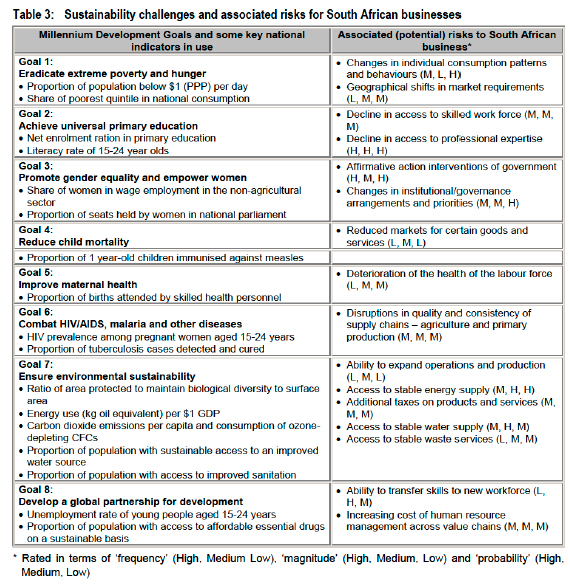
The KPMG 2006 Survey of Integrated Sustainability Reporting in South Africa suggests companies have come a long way as there has been a rise in the disclosure of Black Economic Empowerment status and HIV/AIDS has gained substantial importance and is being addressed in a more significant manner (KMPG 2006). South African business still, however, requires significant improvements in disclosure relating to the severity of environmental incidents and environmental management (KMPG 2006). To this end Trialogue (2009) has attempted to redress the sustainability challenges in which South African business can be more integrative and more aware of their role towards the natural environment. Trialogue (2009) addresses these challenges in five operating dimensions:
• Making operations environmentally sustainable;
• Making operations socially sustainable;
• Making society sustainable;
• Selling products responsibly;
• Influencing suppliers.
Corporate tools and interpretations
A number of tools and approaches have been developed that can assist with the identification of risks and opportunities for planning and strategising purposes within a business. For example, Table 4 summarises the tools and approaches used by business to assess the performances of technologies, and, supposedly, the overall sustainability of technologies. However, Musango and Brent (2010) argue that there is no formal and coherent approach to such techniques from a sustainability perspective. Tools such as the life cycle assessment and the ecological footprint assessment attempt to jointly analyse industrial and environmental systems; however, most of these techniques focus on the impact of emissions, measured in terms of resource consumption and waste emissions, while ignoring the consequence and contribution to the ecosystem (Bakshi 2002; Fiksel 2006). Likewise, environmental management systems and environmental due diligence tools are often not fully attuned to the risks and opportunities arising from degradation of ecosystems and the services they provide (WBCSD 2008).
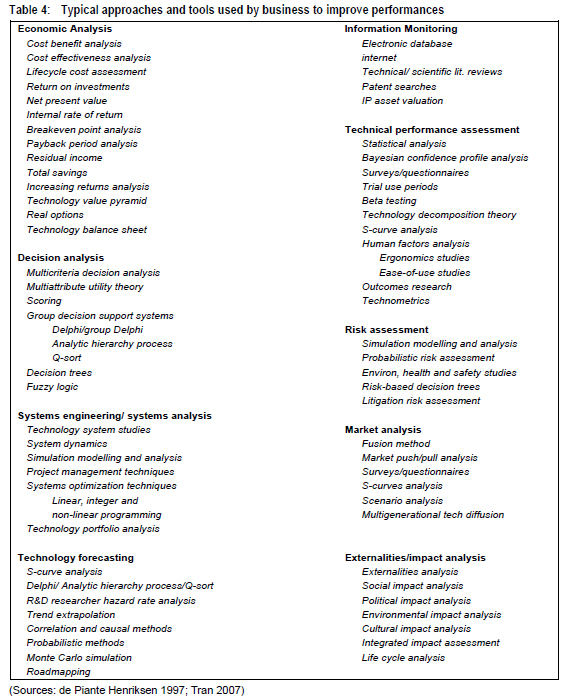
As the understanding of risk expands to incorporate principles of sustainability, it becomes clearer that the interactions between multiple dimensions of risk are increasingly complex to model quantitatively and the standard approach to risk assessment becomes obsolete (Korhonen & Seager 2008). Although some of the techniques may apply systems thinking (mostly from an engineering perspective), none consider, in a comprehensive manner, the causal relations and feedbacks that exist between businesses sharing the same natural resources, the technologies developed and deployed, and the society and natural environment with which the business operates.
The techniques demonstrated by the tools tend to focus on risks to and opportunities for a business as a system in isolation and not as being integrated within a larger social-ecological system. These tools have been about reducing practices that were perceived to be clearly unsustainable. Although business development is an iterative and reflexive process requiring accumulated knowledge combined with the utilisation of both natural and human capital, current efforts to achieve sustainability in the corporate environment are still largely directed at reducing environmental impacts (across business boundaries). While traditional risk based perspective is appropriate for events that can be foreseen or forecasted under a 'business as usual' scenario, a resilience perspective is deemed more appropriate in the context of sustainability, and is concerned with the organisational response in the event of the unusual, unexpected and unforeseen (Korhonen & Seager 2008).
Social-ecological systems as a framework to develop alternative tools and approaches for business
Approaches to sustainability and resource management have been based on a presumed ability to be able to predict probabilistic responses to external drivers (Walker et al 2002). As predictability has become more uncertain due to the complexity and uncertainty of external global drivers, traditional methods for analysing risk has become overwhelming and the goal of sustainable development non-achievable (Fiksel 2003). One of the main reasons that efforts at improving sustainability are failing is because scientists, decision makers and implementers are trying to find solutions from within the same paradigm of thought, using the same tools and adopting the same worldviews that threaten sustainability in the first place (Fiksel 2003; Du Plessis 2008). In this regard business needs to change the paradigm within which it operates, from that of a mechanistic worldview, namely that of neoclassical economics theory, to that of a systematic worldview (Du Plessis 2008).
Responding to the challenges of sustainability requires insight into the characteristics of a sustainable system and a fundamental rethinking of how all business activities are designed, built, operated and evaluated (Bakshi & Fiksel 2003). Sustainability is not an end state that can be reached but rather it is a characteristic of a dynamic, evolving system (Fiksel 2003). In this manner, business needs to appreciate and comprehend that as individuals and society they are embedded in the cyclical processes of the social-ecological system in which they operate (Capra 1997). Business requires a better understanding of both their dependence on the system for the resources it requires and the wastes it absorbs, and the surety of supply of these. Business must divorce itself from the thinking of being separate, and in competition with the social-ecological system in which they operate, to accepting itself as being part of, and co-evolving within the system (Du Plessis 2006).
If business recognises the dynamic interactions between nature and society (Kates et al 2001) and operate as part of the system, it will better understand how dependent it is upon that system and will be better equipped to address elements of risk and uncertainty to establish resilience perspectives and adaption mechanisms (see Table 5), which, in turn, would bring business closer to achieving long-term sustainability. In order to deal with the complexity of the social-ecological systems fundamental changes are needed in the ways that decisions are undertaken (Du Plessis 2008).
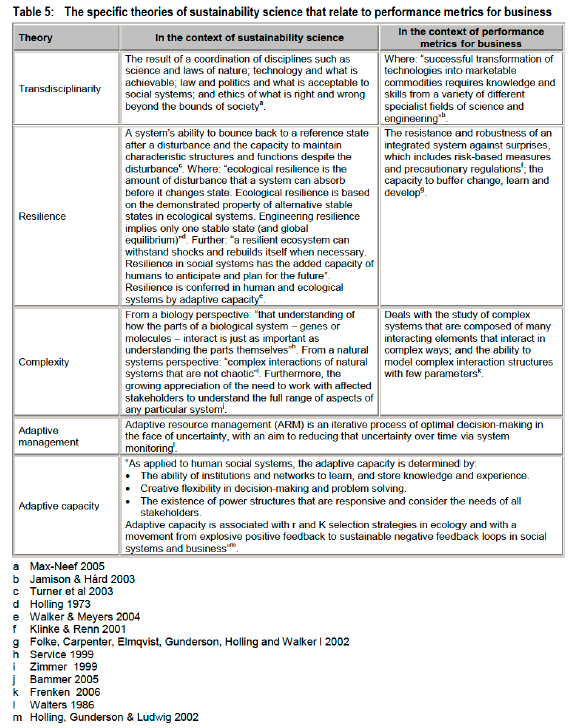
Principles of social ecological systems and their relation to business
The key principles of social-ecological systems are that they are complex and adaptive with properties of self organisation and emergence. Table 5 defines how these principles manifest in business management. A shift is happening in systems research from prediction and control to understanding the resilience of a system in order to provide a foundation for adaptive systems management (Walker et al 2002; Burns, Audouin & Weaver 2006, Korhonen & Seager 2008).
The concept of resilience has emerged as a critical characteristic of complex systems. Social-ecological system resilience is defined as the capacity of a system to absorb disturbance and adapt to change so as still to retain the same function, structure and identity (Walker, Holling, Carpenterm & Kinzig 2004; Walker, Gunderson, Kinzig, Folke, Carpenter & Schultz 2006). More specifically in a business context, business resilience is the capacity for a business to survive, adapt and grow in the face of turbulent change. Business management can destroy or build resilience, depending in how the social-ecological system organised itself in response to management actions (Carpenter, Walker, Andries & Abel 2001; Holling 2001). Faced with a dynamic and unpredictable business environment, management theorists are increasingly identifying the need for resilience (Hamel & Välikangas 2003).
Resilience is, therefore, the potential of a social-ecological system (including business) to remain in a particular configuration and to maintain its feedbacks and functions, but also to reorganise itself following disturbance-driven change (Walker et al 2006). These systems are thereby able to cope, adapt or reorganise themselves without sacrificing the provision of ecosystem services (Folke et al 2002). Resilience also emphasises adaptive capacity, which may lead to a new equilibrium (Walker et al 2006). Adaptive capacity is an aspect of resilience that reflects learning, flexibility, problem solving, and store knowledge. Resilient business systems are thereby able to grow in the face of uncertainty and unforeseen disruptions.
Adaptability describes the ability of an organisation to change practices, resource allocations, designs, relationships or other aspects of the business in response to changing conditions (Korhonen & Seagar 2008). Strategies for adaptability for a business operation may involve technology or reengineering but on a resilience trajectory so that the basic social-ecological system remains recognisable as having all the elements of the original acceptable ecological state (Korhonen & Seagar 2008). Adaptability also implies the ability of the businesses in the social-ecological system to learn. An illustration of the learning process is shown in Figure 2. In the first learning loop, decisions are influenced by information feedbacks from the real world; however, they are deeply influenced by strategies and decision rules, which are formed by our mental models of the real world. In the second learning loop, the information feedbacks modify the structure of our mental models which will prompt us to update the decision rules. Thereby, decision-makers within the organisation can better understand the interaction of the organisation, its operations, and its products or services, with the social-ecological system.
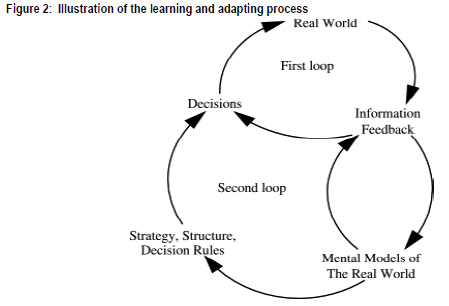
In summary, risk is about understanding the system in which you operate, understanding the resilience of that system and how best to adapt to ensure continued survival and economic viability within the system. The key element with risk in relation to social-ecological system resilience is to understand where resilience resides in the system, and when and how it can be lost or gained (Walker et al 2002).
The manifestation of the principles in the South African context
Recent studies in South Africa re-iterate that continued and concentrated economic and population growth, are putting increasing pressures on supporting ecosystems, requiring a greater understanding of the interdependencies between natural resources, ecosystems and development for sustainable futures (South African Cities Network 2009; Van Huyssteen, Oranje, Robinson & Makoni 2009). This is not only because of growth pressures, but probably even more so because of the way in which this growth is managed and quality of life pursued. Analysis of water availability, biodiversity and land capability shows evidence of these pressures, not only in areas characterised by urbanisation, but also within densely populated rural areas (South African Cities Network 2009).
Within this context informal interviews were held with, and sustainability reports were interrogated for, a number of businesses across South Africa that represent:
• The mining sector;
• The primary production sector;
• The manufacturing sector; and
• The services and retail sector.
Thereby the meaning of corporate sustainability from a South African perspective was ascertained, as well as the drivers and enabling conditions for corporate sustainability, how corporate sustainability is implemented and what the impact of corporate sustainability has been to date. Finally, it was determined to what extent the principles of social-ecological systems manifest in current corporate sustainability practices (see Table 6).
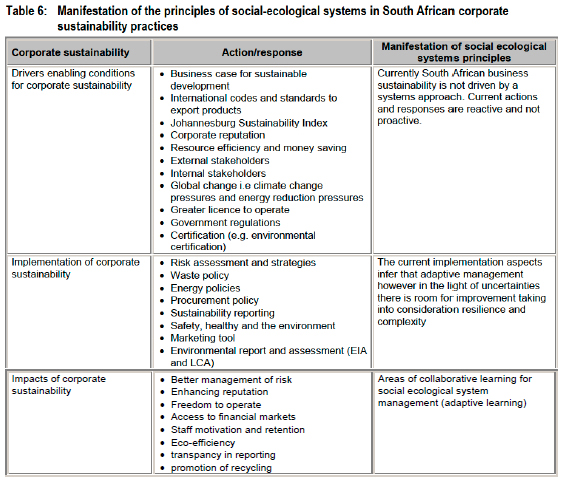
It is clear that South African companies are committed to sustainable development, shown by their commitment to reporting making use of the Global Reporting Initiatives (GRI). Out of the 56 countries that make use of the GRI, South Africa is the fifth largest reporter, representing 58 out of 1 112 reporting entities (Trialogue 2009). While the GRI focuses on companies being transparent in the reporting of their social, economic, governance and biophysical performances, these reports lack a clear understanding of the interaction of operational activities with the social-ecological systems in which they operate. Specifically, the social-ecological system resilience cannot be ascertained in terms of whether the business activities of the past reporting cycle have incurred significant disturbances and, as such, whether the system still retains essentially the same sustainable function (Walker and Meyer 2004).
Business in South Africa currently addresses sustainability aspects of operations on a short term, namely three to five years. These aspects are also addressed through a reactive process mainly in response to common corporate challenges such as energy efficiency, reducing carbon emissions, reducing waste and pollution and having a positive impact of societal aspects; normally by making a 'business case' for addressing the aspects. Sustainability is then addressed outside the social-ecological system that they operate in, and primarily from an internal risk management perspective (Walker et al 2002). However, internal risk management is now becoming more difficult in light of the unpredictable nature of global change resulting in uncertain forecasts and planning; South African business then recognises the need to understand risks to the (external) social-ecological systems, and the opportunities that lie in improving the resilience of the social-ecological systems in which they operate.
Conclusion
Proposed research agenda to improve corporate sustainability management
While there is very little that is fundamentally new theory in this paper, what is new is the notion of moving the paradigm of 'business as usual' into the social-ecological context so as to better understand and address risk and uncertainty to promote resilience of the system and thereby the sustainability of the business.
Despite the clear link between ecological health, social well being and business resilience, corporate sustainability practices have, for the most part, remained fragmented, non-strategic, insular and content with just looking "less bad". Unfortunately, this mindset will do little to reduce the real risks business today face due to global changes to our social and ecological systems. An important research priority for the study of corporate sustainability is development of modelling and decision-making approaches and tools that support dynamic, adaptive management rather than a static optimisation. There is a need to determine the points of intervention in the social-ecological systems in which business operates where resilience can be increased to the desired configurations to future changes. This requires methods for understanding the full implications of alternative choices and their relative attractiveness in terms of enhancing systems resilience. Thereby, extend sustainability science into the field of business management (see Figure 3).
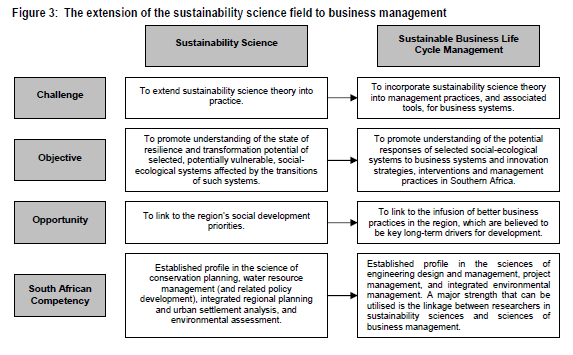
Practical implications to enhance corporate sustainability management
The critical principles upon which to base these new approaches to dealing with extreme scarcity and fundamental uncertainty within business include the following:
- acknowledge and adopt a systems approach to the management of a business by recognising the relationships and interactions between the social and ecological systems relevant to the business.
- diversification of business practices and processes to expose and enable the business to exploit positive outcomes associated with uncertainty and to minimise exposure the impacts of negative consequences of uncertainty.
- minimising negative impacts of business operations on the system and maximising positive impacts (avoid the temptations of adopting cheap green-washing activities that actually do not reduce the damage being done to the environment and that don't improve the resilience of the business to unpredictable negative impacts of declining environmental and social conditions).
- adopt a longer-term perspective (5 to 10 years) on planning and management, so as to avoid the temptation for short-term gains. Sustainability intrinsically demands long-term planning, because the required change is hard to accomplish within a short-time frame due to the complexity of social-ecological systems.
- educate and convince shareholders of the above four points so as to get support for these initiatives. This is important because it is likely that the implementation of new approaches and procedures that fulfil the above 4 requirements will likely incur upfront net economic costs and longer-term future benefits.
It is important to emphasise that these are the 'ideal' and that we don't know all the answers, particularly how to practically implement these principles.
South Africa is at a critical point from a development and sustainability perspective in that it has significant socio-economic development challenges, and yet it still holds reasonably intact and functioning ecosystems. The quest for socio-economic development may well compromise the very social-ecological system that should be sustaining its societies and economic growth. In light of global changes, South African business is realising that changes to the health of the supporting social-ecological system may pose severe risks to business operations and that long term sustainability requires risks to be identified and their potential impact on the future of the business understood. While little progress has yet to be made in developing 'data-driven' and practically implementable approaches and tools to enable businesses to make strategic decisions about systems resilience and adaptation, there is hope in that some businesses are being proactive and funding research proposals in which the social-ecological system of their business operations are mapped and resilience intervention points determined for long term sustainability policies and strategies.
BIBLIOGRAPHY
AZAPAGIC A. 2003. Systems approach to corporate sustainability. A general management framework. Trans IChemE, 81(B):303-316. [ Links ]
BAKSHI B.R. 2002 A thermodynamic framework for ecologically conscious process systems engineering. Computers and Chemical Engineering, 26:269. [ Links ]
BAKSHI B.R. & FIKSEL J. 2003. The quest for sustainability: challenges for process systems engineering. AIChE Journal, 49(6):1350-1358. [ Links ]
BAMMER G. 2005. Integration and Implementation Sciences: Building a new specialization. Ecology and Society, 10(2):6-30. [online] URL: http://www.ecologyandsociety.org/vol10/iss2/art6/ [ Links ]
BURNS M., AUDOUIN M. & WEAVER A. 2006. Advancing sustainability science in South Africa. South African Journal of Science, 102(9/10):379-384. [ Links ]
CAPRA F. 1997. The web of life: A synthesis of mind and matter. London: Flamingo. [ Links ]
CARPENTER S.R., WALKER B., ANDRIES J.M. & ABEL N. 2001. From metaphor to measurement: resilience of what to what? Ecosystems, 4:765-781. [ Links ]
DE PIANTE HENRIKSEN A. 1997. A technology assessment primer for management of technology. International Journal of Technology Management, 13:615-638. [ Links ]
DU PLESSIS C. 2006. Thinking about the day after tomorrow: New perspectives on sustainable building. Paper published in the proceedings of the conference on Rethinking Sustainable Construction 2006: Next Generation Green Buildings (12th Rinker International Conference), held in Sarasota, Florida, USA, September:19-22. [ Links ]
DU PLESSIS C. 2008. A conceptual framework for understanding social-ecological systems. In: BURNS M & WEAVER A. (eds). Exploring Sustainability Science. A Southern African Perspective. Stellenbosch: Sun Press. Pp 59-90. [ Links ]
DEPARTMENT OF ENVIRONMENTAL AFFAIRS AND TOURISM (DEAT). 2008. A National Framework for Sustainable Development in South Africa. Pretoria: Department of Environmental Affairs and Tourism. [ Links ]
DU PLOOY P. 2006. South African Companies in the 21st Century. WWF's Trade and Investment Programme. Cape Town: WWF South Africa. [ Links ]
EHRENFELD J. 2005. The roots of sustainability. Sloan Management Review, 46(2):23-25. [ Links ]
FIKSEL J. 2003. Designing resilient, sustainable systems. Environmental Science and Technology, 37(23): 5330-5339. [ Links ]
FIKSEL J. 2006. Sustainability and resilience: towards a systems approach. Sustainability: Science, Practice and Policy, 2(2):14-21. [ Links ]
FOLKE C., CARPENTER S., ELMQVIST T., GUNDERSON L., HOLLING C.S. & WALKER B. 2002. Resilience and sustainable development: Building adaptive capacity in a world of transformations. Ambio, 31 (5):437-440. [ Links ]
FREEMANTLE A. (Ed.). 2008. The sustainable business handbook: Smart strategies for responsible companies. 5th edition, Cape Town: Trialogue. [ Links ]
FRENKEN K. 2006. Technological innovation and complexity theory. Economic of Innovation and New Technology, 15(2):137-155. [ Links ]
HAMANN R. 2006. Can business make decisive contributions to development? Towards a research agenda on corporate citizenship and beyond. Development Southern Africa, 23(2):1-21. [ Links ]
HAMEL G. & VÄLIKANGAS L. 2003. The quest for resilience. Harvard Business Review, September. [ Links ]
HOLLING C.S. 1973. Resilience and stability of ecological systems. Annual Review of Ecology and Systematics 4:1-23. [ Links ]
HOLLING C.S. 2001. Understanding the complexity of economic, ecological and social systems. Ecosystems, 4:309-405. [ Links ]
HOLLING C.S., GUNDERSON L.G. & LUDWIG D. 2002, Sustainability and Panarchies. In GUNDERSON LG and HOLLING CS. (eds). Panarchy: Understanding transformations in human and natural systems. Washington DC: Island Press. Pp 63-102. [ Links ]
INTERNATIONAL INSTITUTE FOR SUSTAINABLE DEVELOPMENT (IISD). 1992. Business strategies for sustainable development: Leadership and accountability for the '90s. Winnipeg: IISD. [ Links ]
JAMISON A., HARD M. 2003. The story-line of technological change: Innovation, construction and appropriation. Technology Analysis & Strategic Management 15(1):81 -91 [ Links ]
KATES R.W., CLARK W.C., CORELL R., HALL J.M., JAEGER C.C., LOWE I., MCCARTHY J.J., SCHELLNHUBER H.J., BOLIN B., DICKSON N.M., FAUCHEUX S., GALLOPIN G.C., GRUEBLER A., HUNTLEY B., JÄGER J., JODHA N.S., KASPERSON R.E., MABOGUNJE A., MATSON P., MOONEY H., MOORE B., O'RIORDAN T. & SVEDIN U. 2001. Sustainability Science. Science, 292:641-642. [ Links ]
KETOLA T. 2007. Ten Years Later: Where is Our Common Future Now? Business Strategy and Environment, 16:171-189. [ Links ]
KLINKE A. & RENN O. 2001. Precautionary principle and discursive strategies: classifying and managing risk. Journal of Risk Research, 4(2):159-173. [ Links ]
KORHONEN J. & SEAGER TP. 2008. Beyond Eco-efficiency: a resilience perspective. Business Strategy and the Environment, 17:411-419. [ Links ]
KPMG. 2006. 2006 Survey of Integrated Sustainability Reporting in South Africa. [ Links ]
LAFFERTY W. & LANGHELLE O. 1999. Towards Sustainable Development: on the Goals of Development -and the Conditions of Sustainability. London: Macmillan. [ Links ]
MAX-NEEF M.A. 2005. Foundations of transdisciplinarity. Ecological Economics 53:5-16 [ Links ]
MILLENNIUM ECOSYSTEM ASSESSMENT. 2003. Ecosystems and human well-being. Washington, D.C.: Island Press. [ Links ]
MUNSTER F. & LOCHNER P. 2006. Integrating Sustainability into Strategy ISIS: Describing a process to inform sustainability strategies, frameworks and reports - Handbook (version 1). CSIR Report No. ENV-S-I 2005-001. Stellenbosch: CSIR. [ Links ]
MUSANGO J.K. & BRENT A.C. 2010. Assessing the sustainability of energy technological systems in Southern Africa: A review and way forward. IAMOT Proceedings, Cairo, Egypt. [ Links ]
PEARCE J.A. & ROBINSON R.B. 2007. Strategic management: Formulation, implementation and control. 10th edition. Chicago: McGraw-Hill. [ Links ]
RODRIGUEZ M.A., RICART J.E. & SANCHEZ P. 2002. Sustainable development and the sustainability of competitive advantage: A dynamic and sustainable view of the firm. Creativity and Innovation Management, 11:135-146. [ Links ]
RUTHERFORD P. 2006. How have international business discourses on the environment changed over the last decade? Global Social Policy, 6(1):79-105. [ Links ]
SCHALTEGGER S. & WAGNER M. (Eds.). 2006. Managing the business case for sustainability: The integration of social, environmental, and economic performance. Sheffield: Greenleaf Publishing. [ Links ]
SERVICE R.F. 1999. Exploring the systems of life. Science, 284(5411):80-83. [ Links ]
SOUTH AFRICAN CITIES NETWORK. 2009. Sustainable Cities 2009. Johannesburg: South African Cities Network. [ Links ]
TRIALOGUE. 2009. The Sustainability Handbook. Sixth Edition-July 2009. Cape Town: Trialogue. [ Links ]
TRAN T.A. 2007. Review of methods and tools applied in technology assessment literature. PICMET Proceedings, Portland, Oregon, USA. [ Links ]
TURNER B.L., KASPERSON R.E., MATSON P.A., MCCARTHY J.J., CORRELL R.W., CHRISTENSEN L., ECKLEY N., KASPERSON J.X., LUERS A., MARTELLO M.L., POLSKY C., PULSIPHER A., SCHILLER A. 2003. Science and technology for sustainable development special feature: A framework for vulnerability analysis in sustainability science. Proceedings of the National Academy of Science USA, 100(14):8074-8079. [ Links ]
VAN HUYSSTEEN E., ORANJE M., ROBINSON S. & MAKONI E. 2009. South Africa's city regions: A call for contemplation...and action. Urban Forum, 20(2):175-194. [ Links ]
WALKER B., CARPENTER S., ANDERIES J., ABEL N., CUMMING G., JANSSEN M., LEBEL L., NORBERG J., PETERSON G.D. & PRITCHARD R. 2002. Resilience management in social-ecological systems: a working hypothesis for a participatory approach. Conservation Ecology, 6(1):14 [online] URL: http://www.consecol.org/vol6/iss1/art14. [ Links ]
WALKER B., HOLLING C.S., CARPENTERM S.R. & KINZIG A. 2004. Resilience, adaptability and transformability in social-ecological systems. Ecology and Society, 9(2):5 [online] URL: http://www.ecologyandsociety.org/vol9/iss2/art5. [ Links ]
WALKER B. & MEYERS J.A. 2004. Thresholds in ecological and social-ecological systems: a developing database. Ecology and Society 9(2):3 [online] URL: http://www.ecologyandsociety.org/vol9/iss2/art3. [ Links ]
WALKER B., GUNDERSON L., KINZIG A., FOLKE C., CARPENTER S. & SCHULTZ L. 2006. A handful of heuristics and some propositions for understanding resilience in social-ecological systems. Ecology and Society, 11 (2):13 [online] URL: http://www.ecologyandsociety.org/vol11/iss1/art13. [ Links ]
WALTERS C. 1986. Adaptive management of renewable resources. New York: Macmillan. [ Links ]
WELFORD R. & GOULDSON A. 1993. Environmental Management and Business Strategy. London: Pitman Publishing. [ Links ]
WELFORD R. 1995. Environmental Strategy and Sustainable Development. The Corporate Challenge for the 21st Century. London: Routledge. [ Links ]
WELFORD R. 1997. Hijacking Environmentalism. Corporate Responses to Sustainable Development. London: Earthscan. [ Links ]
WORLD BUSINESS COUNCIL FOR SUSTAINABLE DEVELOPMENT (WBCSD). 2004. Running the Risk. Risk and sustainable development: a business perspective. Conches-Geneva: WBCSD. [ Links ]
WORLD BUSINESS COUNCIL FOR SUSTAINABLE DEVELOPMENT (WBCSD). 2006a. Catalyzing Change. A short history of the WBCSD. Conches-Geneva: WBCSD. [ Links ]
WORLD BUSINESS COUNCIL FOR SUSTAINABLE DEVELOPMENT (WBCSD). 2006b. From Challenge to Opportunity. The role of business in tomorrow's society. Conches-Geneva: WBCSD. [ Links ]
WORLD BUSINESS COUNCIL FOR SUSTAINABLE DEVELOPMENT (WBCSD). 2008. Guidelines for Identifying Business Risks and Opportunities Arising from Ecosystem Change. Version 1. Conches-Geneva: WBCSD. [ Links ]
WORLD BUSINESS COUNCIL FOR SUSTAINABLE DEVELOPMENT (WBCSD). 2009. Water, Energy and Climate Change - A contribution from the business community. Conches-Geneva: WBCSD. [ Links ]
WORLD COMMISSION ON ENVIRONMENT AND DEVELOPMENT (WCED). 1987. Our common future. Oxford: Oxford University Press. [ Links ]
WORLD WILDLIFE FUND. 2008. Living Planet Report 2008. Switzerland: WWF International. [ Links ]
ZIMMER C. 1999. Life after chaos. Science, 284(5411):83-86. [ Links ]














